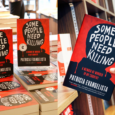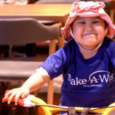While the planned balloon drop at Cove Manila last New Year’s Eve was trending for a few days, we haven’t really heard much about what happened afterwards. Well, Anna Varona, Founder of the Clean Our Oceans Project, has been staying on top of the situation.
First and foremost, the Clean Our Oceans Project is about lessening people’s plastic use and decreasing plastic in the ocean first. However, Anna points out that the project advocates upcycling as an alternative that prevents plastics from entering the Marine ecosystem. “It is a transition from the current system we have of dumping in landfills and rivers,” she explains. “It is an alternative while people get used to the idea of managing their own waste, getting government help to make segregation easier and used to the idea of alternative disposal systems.”
On December 30, Clean Our Oceans Project was invited to Cove Manila, where they inspected the material of said balloons and what should be done with it.
Here is the procedure that Anna suggested in line with CoOp’s principles:
1. Deflate the balloons AND CUT THEM IN HALF as a gesture to reassure the public the balloons will not be used. Anna volunteered for CoOp to do the accounting.
2. Supply CoOp with photos of the balloon packaging to aid engineers in checking what kind of material they are really made of. This will also help them determine the method they can use for upcycling.
3. Anna suggested the balloons be incorporated to manufacture school chairs. Okada can donate these chairs to surrounding schools. Anna explains that there was a shortage of 4.5 million school chairs in the Philippines in 2004. “With our increasing population, I surmised a rising need,” she says.
4. The goal of CoOp is to prevent plastic from invading the marine ecosystem, keep it within the circle of economy and utilized by humans. The facility can manufacture parts to repair the chairs. If it gets broken, it can be fixed (preventing it from being thrown in a landfill or the Ocean). If the school wants to get rid of it, CoOp can take it back (preventing it from being thrown in a landfill or the Ocean).
5. Lastly, CoOp will have a series of talks with Okada about lessening plastic waste and the importance of marine conservation. CoOp advocates responsibility for the waste we create. This method will teach accountability and hopefully make them see their impact in the environment.
Apparently, Anna was told that Okada was going to abide by the suggestions above. On December 31, Okada said they were ready to turn the balloons over to CoOp. Anna reiterated that CoOp would accept the balloons only with the conditions stated above and they have not called back since then. You may read her full post here:
We have reached out to Cove Manila and Okada for comment and will update this article if we hear back.




